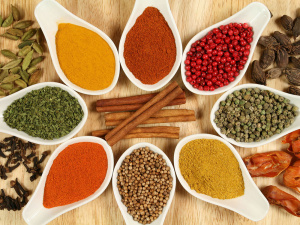Difference between revisions of "Language/Iranian-persian/Vocabulary/Herbs-and-Spices"
< Language | Iranian-persian | Vocabulary
Jump to navigation
Jump to search
| Line 1: | Line 1: | ||
[[File:Spice1.jpg|thumb]] | [[File:Spice1.jpg|thumb]] | ||
Persian culture is one of the oldest on the planet. Thanks to its geographical location along the Silk Road in the Middle East, Persia and its cuisine have been influenced by many cultures over the centuries, including Russian, Greek, Asian and Armenian cultures. | |||
Thanks to the abundance of exotic spices available through trade along the Silk Road, Persian cooks tried many exciting spice combinations centuries ago. And they liked it. Even today, Iranian dishes use a multitude of spices and herbs that give them very powerful aromas and flavors. This is why Persian cuisine has gained popularity in the Western world over the past few decades. | |||
{| class="wikitable sortable" | {| class="wikitable sortable" | ||
!English | !English | ||
Revision as of 16:23, 19 November 2022
Persian culture is one of the oldest on the planet. Thanks to its geographical location along the Silk Road in the Middle East, Persia and its cuisine have been influenced by many cultures over the centuries, including Russian, Greek, Asian and Armenian cultures.
Thanks to the abundance of exotic spices available through trade along the Silk Road, Persian cooks tried many exciting spice combinations centuries ago. And they liked it. Even today, Iranian dishes use a multitude of spices and herbs that give them very powerful aromas and flavors. This is why Persian cuisine has gained popularity in the Western world over the past few decades.
| English | Persian | Pronunciation |
|---|---|---|
| caraway | زیره | zire |
| fennel | رازیانه | razyane |
| red pepper | فلفل قرمز | felfel ghermez |
| coriander (seeds) | (دانه) گشنیز | geshniz |
| black pepper | فلفل سیاه | felfel seyah |
| ginger | زنجبیل | zanjabil |
| cardamom | هل | hel |
| cinnamon | دارچین | darchin |
| Saffron | زعفران | zaferan |
| Turmeric | زردچوبه | zardchobe |
